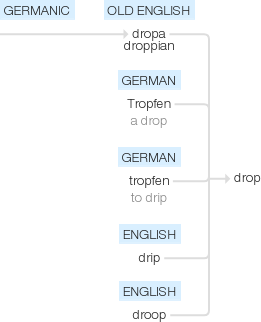Drop
Old English dropa (noun), droppian (verb), of Germanic origin; related to German Tropfen ‘a drop’, tropfen ‘to drip’, also to drip and droop.
wiktionary
From Late Middle English droppe, Middle English drope(“small quantity of liquid; small or least amount of something; pendant jewel; dripping of a liquid; a shower; nasal flow, catarrh; speck, spot; blemish; disease causing spots on the skin”)[and other forms], [1] from Old English dropa(“a drop”), from Proto-West Germanic *dropō(“drop (of liquid)”), from Proto-Germanic *drupô(“drop (of liquid)”), [2] from Proto-Indo-European *dʰrewb-(“to crumble, grind”).
From Middle English droppen, dropen(“to fall in drops, drip or trickle down; to scatter, sprinkle; to be covered with a liquid; to give off moisture; of an object: to drop, fall; of a living being: to fall to the ground”)[and other forms], [3] from Old English dropian, droppian(“to drop”), [4] from dropa(“a drop”) (see further at etymology 1) + -ian( suffix forming verbs from adjectives and nouns).
etymonline
drop (n.)
Middle English drope, from Old English dropa "a small, spherical mass of liquid," from Proto-Germanic *drupon (source also of Old Saxon dropo, Old Norse dropi, Dutch drop, Old High German tropfo, German Tropfen (n.)); see drop (v.).
Sense of "minute quantity of anything, least possible amount" is from c. 1200. Meaning "an act of dropping" is from 1630s; of immaterial things (prices, temperatures, etc.) from mid-19c. Meaning "lozenge, hard candy" is 1723, from resemblance in shape. Meaning "secret place where things can be left illicitly and picked up later" is from 1931. Theatrical meaning "painted curtain dropped between scenes to conceal the stage from the audience" is by 1779.
Drop in the bucket (late 14c.) is from Isaiah xl.15 [KJV]. At the drop of a hat "suddenly" is from 1854. To get the drop on "be prepared before one's antagonist" originally was Old West gunslinger slang (1869).
drop (v.)
Middle English droppen, from Old English dropian "to fall in drops, fall in small portions or globules, as a liquid." The word is part of a related series of verbs in Proto-Germanic that also yielded Old Saxon driopan, Old Frisian driapa, Dutch druipen, Old High German triufan, German triefen, and in English drip, droop, and obsolete dreep and dripe. Related: Dropped; dropping.
In reference to a solid object, "to fall vertically" from late 14c. The transitive sense "allow to fall" is from mid-14c. To drop in "visit casually" is from c. 1600; drop-in (n.) "a casual visit" is attested by 1819. The notion in drop (someone) a line "write a letter" (1769) is of dropping a message into a letter-box. Exclamation drop dead to express emphatic dislike or scorn is from 1934; as an adjective meaning "stunning, excellent" it is recorded by 1970 (compare killing, etc.).
